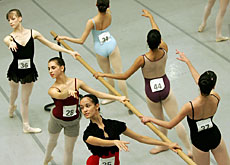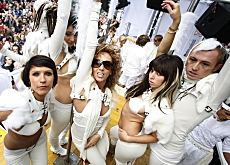Spoerli keeps Zurich Ballet on its toes

Zurich Ballet director Heinz Spoerli is celebrating ten years at the helm of the company, during which time he has built up the ensemble's international reputation
The prolific choreographer – or dancemaker as he likes to be known – tells swissinfo about his fascination with dance and how he sees the art form developing in the future.
Spoerli already had an illustrious career behind him when he arrived in Zurich. The former dancer turned choreographer had spent time at the Basel Ballet – turning the company around – and at the Deutsche Oper am Rhein in Düsseldorf, Germany.
Zurich Ballet was divided over modern and classical dance on Spoerli’s arrival. He made it neoclassical – it dances the classics, often with original touches, but also works by modern-day choreographers, including his own.
The company, which often plays to full houses in Zurich, tours extensively around the world. Among Spoerli’s best-known choreographies are the Goldberg Variations and In den Winden im Nichts, also based on Bach.
swissinfo: You’ve described yourself as a “dancemaker” rather than a choreographer.
Heinz Spoerli: I work with a very wide range of choreography, I can do a show, I can do a very classical piece like Bach and I can do the classics. That means I am dancemaker rather than a choreographer with my own style. I produce what is necessary to have a good company and keep it alive.
swissinfo: Has your own choreography changed over the years or have you always kept a particular line?
H.S.: I have kept the line that I am a neoclassical choreographer, but I get very excited about new choreographers, I go and see everything and that inspires me for my own work. It’s important that you always stay alive, that you keep up with the times using different music, bringing that museum [of ballet] to life to show pieces of today.
swissinfo: What fascinates you about dance?
H.S.: Dance has something to do with music, with space, with colours and taste, and with human beings. Dance is always a dialogue with a partner… When you do another ballet you put a different combination of people together. Something else is happening and that is what makes dance so fascinating.
And of course there’s the music, which gives you an emotion that allows you to reach the public and this is much better than any movie.
swissinfo: But ballet does not seem to be a highly promoted art form in Switzerland.
H.S.: Ballet is difficult everywhere at the moment because it’s seen as old fashioned, but it’s not. I consider myself contemporary because I do ballet now.
The problem is that in Switzerland there aren’t so many schools. There is only one official school [in Zurich] and I think there should be more.
We have no language barriers nowadays, people can afford to travel, so you’ll find a lot of Swiss dancers in other countries, and we have a lot of foreign people here. In my company at the moment there are four Swiss dancers and this changes all the time.
The Swiss want to play tennis, football or an instrument, so they don’t focus anymore on one thing and when you dance after a certain age [by your teens] you have to focus on it. That’s not the aim of parents, as they want to have a safe profession for their kids.
swissinfo: What are you looking for in your dancers?
H.S.: They have to have a certain technique, fit in with my company and want to dance not only for the money – there’s not much money to be made in dance – but also because it’s a wonderful way of life.
I work with 26 nations. When I started there were two or three, maybe French, English and German, and now you have Russians, Australians, Americans, Thais and Koreans and that makes it wonderful. But it was always a “United Nations”, and we already had globalisation in the 1950s and 60s.
swissinfo: How do you see ballet developing in the future?
H.S.: I hope that young choreographers will realise that everything they see can be used in dance, no matter where you are.
And you shouldn’t stay in one place because dance is always changing, it’s not like a painting you hang on the wall – the painting always changes colours and is always new. That is what makes this art so difficult, because you have nothing you can show for life, you have to always develop in another direction.
Classical dance has also made a step forward. People see that not all companies can be contemporary and that theatre still needs classical dance to fill the house. In London especially there is a new breed of choreographers and that’s very nice to see.
swissinfo-interview: Isobel Leybold-Johnson in Zurich
The Zurich Ballet has 38 dancers in the main company and 15 youngsters from the Junior Ballet, which was set up by Spoerli to promote a new generation of dancers.
The ballet company is widely recognised as having greatly improved its reputation since Spoerli’s arrival. European media have praised it as one of the world’s best.
Among this season’s highlights are Don Quixote, Swan Lake and Spoerli’s moZART.
Basel-born Spoerli first took to the stage as a dancer, earning his laurels in Germany and Canada.
He later turned to choreography. After a brief period in Geneva, he was hired as ballet director in Basel, aged just 30, spending 17 years there.
Spoerli then left for Düsseldorf, for the larger ballet at the Deutsche Oper am Rhein, which allowed him to gain more international experience.
After five years, Spoerli returned to Switzerland to the Zurich Ballet. He has just celebrated his tenth anniversary as director of ballet and chief choreographer.
Spoerli’s choreography includes abstract and narrative ballets. He has been described as having a “huge ability for improvisation” and showing “relaxed imagination” and “enough humour not to really take himself too seriously”.

In compliance with the JTI standards
More: SWI swissinfo.ch certified by the Journalism Trust Initiative




You can find an overview of ongoing debates with our journalists here. Please join us!
If you want to start a conversation about a topic raised in this article or want to report factual errors, email us at english@swissinfo.ch.